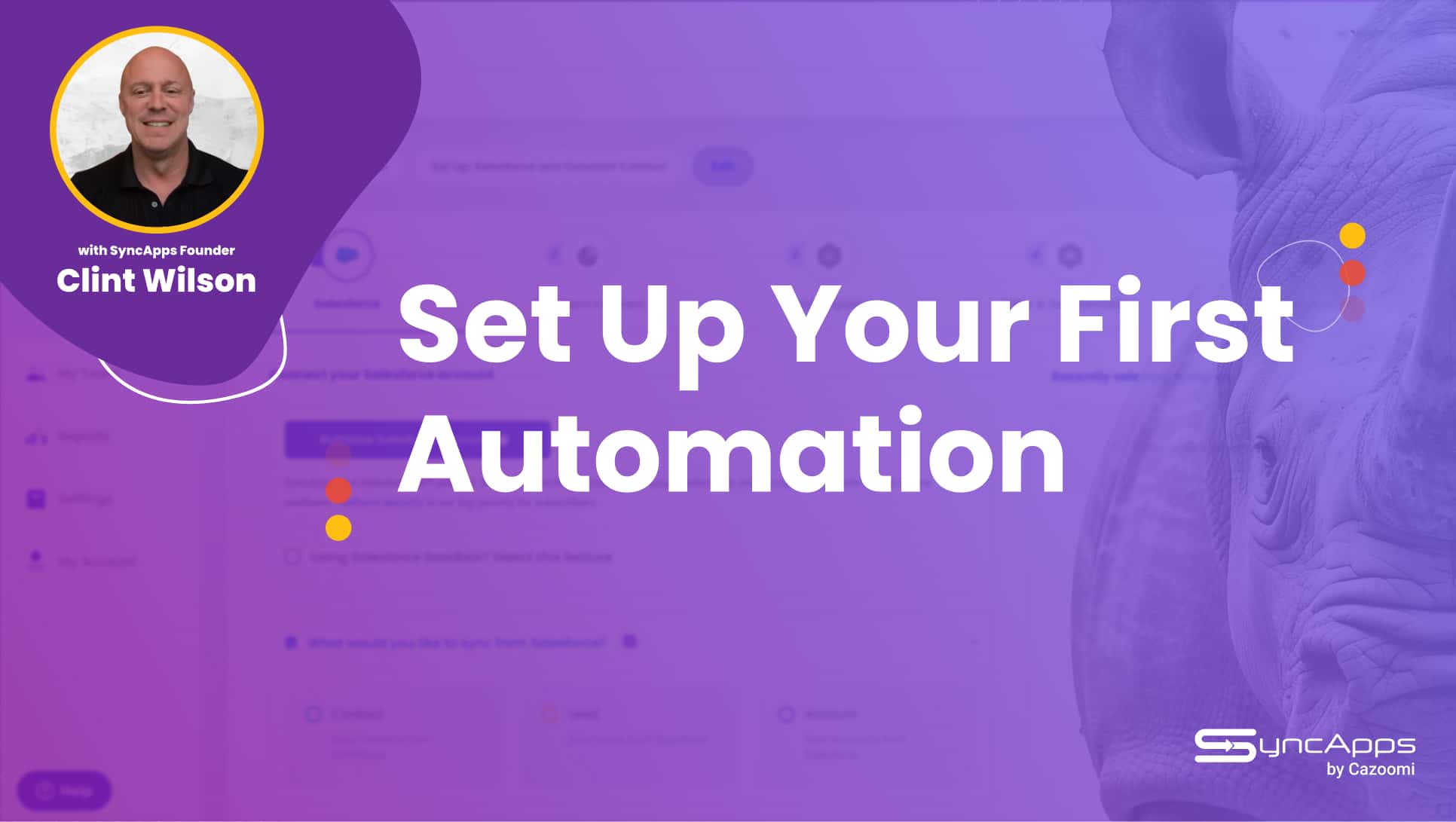What Is iPaaS and Why Does It Matter for Your Small Business?


Does the running of your business demand the use of multiple business software solutions?
Do you always have to switch between these solutions every day?
Are you always dealing with corrupt or incomplete data?
Lastly, do you feel like you are spending too much time moving data between these applications?
If yes, you must be already tired and cannot wait to find a perfect solution to all these troubles.
Relax! You aren’t alone!
All growing businesses eventually face the challenge of connecting their mission-critical solutions. There is an application or software solution available for nearly every aspect of a company’s operations. While this abundance of options is beneficial, it also presents a range of challenges.
For instance, the various solutions your small business uses contain essential organizational data. This data needs to be shared among all applications to ensure the smooth operation of the business.
And that’s where the problem arises.
How can your company ensure speedy sharing of data among applications and its teams? Most importantly, how can your business govern the quality of its data? As complex as it may sound, it can be done.
The Good News – iPaaS!
Upon identifying this fundamental need for companies across all industries, vendors of the Integration Platform as a Service started to offer cloud-based integration solutions. The platforms offer one location for connecting business applications and automating data movement between them.
iPaaS simplifies app integration across multiple on-premises as well as cloud environments. The objective is to help the user speed up innovation and, at the same time, reduce the overall integration and operating costs.

Image Source: Smart Sheet
Integration Platform as a Service (iPaaS) simplifies and standardizes the connection of applications, processes, data, and services across private and public cloud environments, as well as on-premises systems. This approach eliminates the need to purchase, install, manage, or maintain integration software, middleware, and hardware within your data center.r.
While iPaaS solutions are primarily utilized by B2B organizations that frequently share data across various business applications, they are also extremely beneficial for small and medium-sized B2C businesses that operate multiple solutions requiring effective data sharing.
Businesses that have implemented iPaaS solutions report enhanced workflow and improved data quality. iPaaS helps users better manage and govern their data, reducing the issues associated with poor-quality information.
The market for iPaaS has solutions for businesses of all sizes with a special class of enterprise iPaaS emerging to cater to the scaled needs of businesses. Small and medium-sized businesses are also benefiting from iPaaS solutions especially because of the availability of vendors whose solutions are designed with the integration needs of small businesses in mind.
Such iPaaS solutions help you leverage automation processes like notifications and customer data updates. Some iPaaS products are targeted towards very small enterprises with needs such as customer data syncing and cross-platform communication with clients.
With all these options at your disposal, you don’t have an excuse for not embracing iPaaS solutions. Of the utmost importance is to identify a reliable iPaaS provider who will, in turn, recommend the right integration for your business.
Now that you know what iPaaS is, it’s imperative to also know how it works and why it matters for your small business. This way, you get to understand why it’s a must-have, and not just invest in it because everyone else in your industry is doing it.
How Does iPaaS work?

Image source: Search Cloud Computing
To understand how iPaaS works, we must first look at some of its most important features.
- Leveraging cloud technologies – this feature helps streamline complex integration flows, enhance efficiencies, ensure better management of resources, and also minimize costs.
- Embedded integration – tired of tasking your IT teams with the synchronization and migration of data? The embedded integration iPaaS solutions facilitate straightforward data synchronization and migration by customers. This way, your IT team can concentrate on other pressing and more important company matters.
- Self-serve data preparation – this feature entails integration flows like the formation of reusable data preparation procedures capable of delivering data to self-serve analytics as well as business intelligence tools.
- Data exchange in B2B environments which allows the secure flow of data within collaborating networks. As a result, your IT teams need not write APIs-based code. Data exchanges in B2B also speeds up the process of all onboarding partners and customers.
- Replace routine roles in sales and management. Besides gathering contact details of all the people attending a live or online event, it also quickly integrates the information into the customer management software or your company’s marketing automation platform.
- A virtual infrastructure that’s easy to handle. As long as you can identify a versatile iPaaS provider, you can look forward to seamless integration with the best cloud platforms in the market or other virtual architecture that is hosted locally. Irrespective of the present design, your iPaaS provider should be in a position to host it, besides permitting the use of other cloud techs without compromising manageability.
- Excellent data warehousing and integration. You must already know that the absence of business intelligence can stand on your way when it comes to profit-making. As such, the iPaaS platform you choose should facilitate near-real-time data sharing between applications, data stores and so on.
- Development of applications and continuous delivery – the best iPaaS should encourage teams to internally develop or depend on cloud-based tools to create, integrate and provide applications across the company.
- Compliance and security – A reliable iPaaS (Integration Platform as a Service) solution can be trusted with sensitive data. With the increasing rates of cybercrime, businesses prioritize security when selecting cloud-based solutions. Organizations are particularly cautious about integrating sensitive data such as personal information, customer records, and passwords, which are vulnerable to breaches and misuse. iPaaS solutions offer robust security features, including data encryption, password protection, session management, access control, and adherence to information security standards.
Once you’ve identified the appropriate iPaaS provider, they will supply the necessary servers, data infrastructures, and software tools to help you build, test, deploy, and manage applications in the cloud.
Most iPaaS products include built-in transformations and mappings to streamline the development of integration flows. They come equipped with prebuilt connectors and business rules that define various interactions, with a multi-tenancy setup that is common in many scenarios.
Therefore, the iPaaS provider can be equated to a contractor hired to manage the renovation of a canteen. Once the canteen owner takes out appliances, lighting, and flooring, the responsibility of getting the job done remains with the contractor. The same applies to iPaaS. The governance and management of the various services stay with the iPaaS vendor.
The ability to act on your business data is critical to the success and growth of your company. Small business owners cannot afford to continue tying down business data in disconnected applications.
In the absence of application integrations, users get stuck when moving data manually from one platform to the other. This works against the productivity and profitability of a firm. Besides being too slow, the process of manual data entry is linked to one too many costly mistakes.
The greatest challenge lies in learning how to connect the various systems. Doing so demands intimate knowledge of the way every application reads and receives data to facilitate proper application communications.
While moving data between applications, you must have a thorough understanding of data transformation for another application to accept it. Note that data representation in a source application field will not always correspond to a similar field in the destined application.

Image Source: Funnel
That’s why small businesses should seriously consider implementing iPaaS solutions. The software deploys tools that users utilize to create generate integration workflows for moving data from one application to another and hence, overcome the above-mentioned challenge.
The majority of iPaaS solutions make it possible for users to leverage pre-created connectors, data mapping as well as business rules to facilitate automation in data movement.
Before iPaaS solutions existed, users didn’t have much option than to create custom code to allow connection between their various applications. Unfortunately, apart from being a robust undertaking, custom code does not pan out well in the long term.
Ultimately, users have to deal with a near rigid solution incapable of supporting emerging needs, besides being too hard and expensive to maintain over time.
iPaaS takes care of these challenges and numerous others. Every business, including small businesses, should see it as a viable and worthwhile investment.
Not yet convinced that your small business needs iPaaS software?
Let us consider the various benefits associated with the use of iPaaS. It will help you realize why it matters for your growing business.
Benefits of iPaaS for Your Small Business
Without further ado, let’s take a close look at what iPaaS can really do for your business:
- It allows speedy and easy integrations
Hand-coded integrations and ESBs are particularly good for on-premises systems, complex IT infrastructures, as well as legacy apps. On the other hand, when an iPaaS solution fits a given integration use case, it gives birth to faster and simpler application connections.
How?
iPaaS eliminates the delays associated with the traditional integration methods by allowing you to integrate applications and even connect on-premises applications and cloud services. Also, with iPaaS, there is low coding – and at times no coding at all – thanks to pre-built integrations that allow users to quickly build application connections.
Some more user-friendly iPaaS software has the potential to create APIs for a broad range of data sources within minutes. This is a lot faster compared to the manual and hand-coded strategies that need about 34 days to create a single API.
- iPaaS offers an inexpensive and cost-effective integration solution
Organizations that use other app integrations can attest to spending hundreds of thousands of dollars, and at times millions, annually. Any business that has ever outsourced custom-coded integrations can tell you that the affair is even costlier. Note that we’ve not even taken into account the price and the cost of maintaining the on-site hardware demanded by these solutions.
In many instances, an iPaaS connects your applications in literally minutes. Additionally, the solution provider handles the connections and also maintains data connected at highly affordable monthly and annual subscription rates. iPaaS allows users to enjoy a predictable and manageable periodical expense. Moreover, the user only pays for the service level they need and doesn’t incur a big up-front investment.
- It allows easy adaptability and it’s user-friendly
This is yet another good reason why your business should consider moving to iPaaS. Thanks to its easy adaptability, iPaaS can easily achieve any change or a new requirement as long as your applications are equally responsive to changes. This way, you are assured that your integration platform will grow as your business grows.
The predefined integration processes that come with iPaaS enable users to integrate their applications fast. Small businesses benefit greatly from this, especially because there is no need for a big team, effort or time to kickstart the integration process. Also, you won’t have to worry about hiring high-end developers to get your applications interconnected.
- It offers better data security and compliance
Compared to the conventional integration solutions such as ESBs, the security and governance features of iPaaS are more advanced. When choosing an iPaaS solution provider, check if it offers the following: advanced API logging potential, role-based access control, features such as SOC2, HIPAA and so on that meet regulatory and corporate compliance standards and so on.
A good iPaaS solution should also offer support for the most recent enterprise authentication technology.
- iPaaS permits real-time integrations
Is your small business into big data processing? Today, organizations are handling more data than they ever predicted, and at the same time, handling migration to the cloud.
According to recent statistics, 90 percent of the data in the world was generated during the past two years.

Image Source: Baseline
More fascinating is the finding that by the end of 2020, a third of all the world’s data will live or pass via the cloud. It explains why 45 percent of companies have already embraced integration as far as their big data processes and the cloud are concerned.
Note that iPaaS technology is fundamentally cloud-based. This feature makes iPaaS a unique integration solution for handling high volume and real-time data integrations as well as almost real-time processing demands of modern enterprise IT infrastructure.
Its powerful capability to synchronize data quickly iPaaS technology could be your perfect solution for overcoming big data growth-related problems.
- iPaaS minimizes integration redundancy for companies with multitenant applications
Today, organizations, including small businesses, have reaped immense benefits from the deployment of multiple applications to handle various functions and tasks. Handling all these applications can be demanding, and in the absence of the right integration solution, redundancy can occur.
What your business needs is an iPaaS solution as it provides an efficient means of building multitenant applications with your software running as a single instance serving multiple ‘tenants.’
It could be a SaaS application that you create to serve millions of customers via a web portal such as Salesforce. It could also be a tailor-made business application benefitting different departments in your firm.
iPaaS connections are best suited for multi-tenant apps due to their ability to decrease integration redundancies, and at the same time, providing massive scalability for bringing new tenants on board. Since they are also indigenous to cloud services, iPaaS connections also get rid of massive software and hardware demands associated with multi-tenant infrastructure.
- Limitless horizontal scalability for the internet of things
The internet of things is a formidable force in the world of business and for good reasons. For instance, IoT’s profit-enhancing potential is unlimited.
As of 2019, the installed base of the internet of things connected devices stood at approximately 26 billion with predictions suggesting double this figure by 2023.

Image Source: Statista
You are mistaken if you think that traditional integration solutions can handle the massive horizontal scalability needed in IoT integrations.
Picture a situation where your business is dealing with huge volumes from hundreds of thousands or millions of endpoints. Your small business requires iPaaS solutions to accommodate these workloads with real-time integrations of data as well as near-real-time processing.
How Does the Future of iPaaS Look?
You cannot help but wonder what will happen to iPaaS in the future? The truth is iPaaS is, in fact, maturing as an industry — from what was initially used as a department function to what is now a fully-fledged platform that delivers faster and smarter communication between various applications.
While experts can only make predictions, one of the clearest things is that iPaaS is here to stay and it will only get better and bigger – explaining why more and more businesses are investing in such solutions.

Image source: Adverity
Signs that the iPaaS market is set to experience faster growth rates are everywhere. One thing is for sure – iPaaS is disrupting the rules of engagement. Successful markets encourage competition to ensure the delivery of better products and services. Already, the market for iPaaS is flooding with competitors and the more reasons, you should be careful when choosing an iPaaS software provider.
Is your IT department currently under excessive pressure? Well, iPaaS is great at helping you make the burden lighter for your team. Some of the primary reasons for employee burnouts include unreasonable workload, unfair compensation and near unbearable overtime work.
iPaaS is a great way to free up IT employees from demanding activities that take too much of their time and attention, and unfortunately, pay too little. With iPaaS in place, your IT workers can engage in more exciting and less recurring tasks, and in turn, suffer fewer burnouts.
Does your small business operate within the service industry? If yes, then iPaaS matters even more. Like the rest of service-oriented companies, your small business must also be hungry for productivity gains.
Productivity is still one of the most debated topics within the services sector. Until now, artificial intelligence hasn’t lived up to its promise of offering solutions to issues of productivity gains.
If you watch closely, you will realize that iPaaS is slowly positioning itself as an alternative to artificial intelligence, and hence, a more viable route toward the realization of short-term productivity gains.
How Do You Identify the Best iPaaS Solution Provider?
Various factors should come into play when choosing an iPaaS software vendor. First things first, find out if connectors are needed, and if yes, are they available? Secondly, seek to know how the solution handles data transformation to help you prepare for data compatibility issues.
Other factors to consider include the number of data sources that require integration, the intended platform users, and the existing data security concerns.
Most importantly, ask your provider if they will scale with the growing needs of your business as you might want to include additional system resources – and even more!
Conclusion
Not sure if your business requires iPaaS? Answer the following questions:
- Does your business depend on cloud-based management systems namely IaaS, SaaS and PaaS?
- Does your business ever need to connect information from on-premise solutions and cloud2cloud applications?
- Did you choose Enterprise Application Integration (EA1) – the application integration system that came before the present iPaaS platforms – and now wish to eliminate various disadvantages including longer implementation times and the associated higher economic costs?
If you’ve answered yes to at least one of the questions above, then your small business needs an iPaaS solution to break free from the current predicaments. Embracing iPaaS will help you have a lot in common with business environments when it comes to the isolation of data and applications.
iPaaS allows businesses to integrate services and applications favoring automation of new processes as well as real-time data availability from multiple sources. When this data is analyzed, it becomes a crucial resource to your company.
And here’s the best part: with an iPaaS solution in place, you can now connect all your business solutions under a single platform and automate your business processes!








